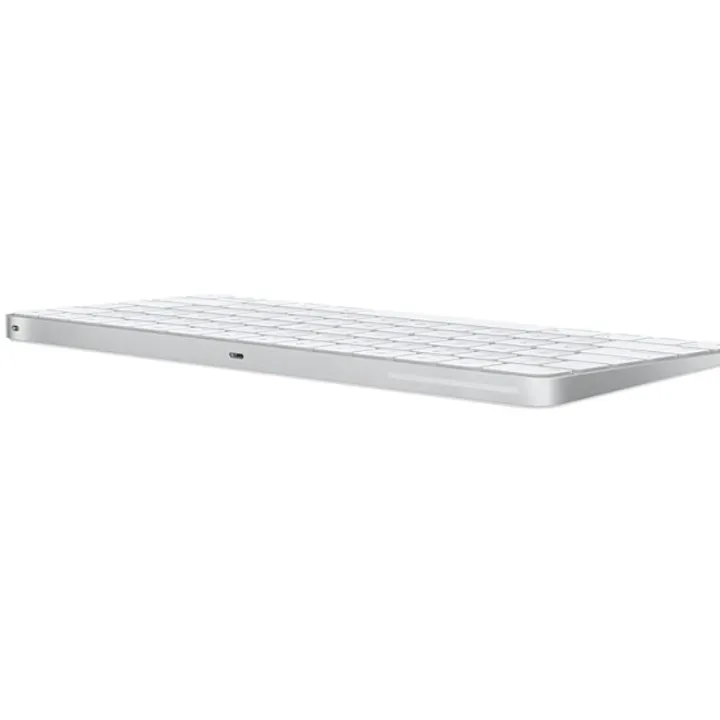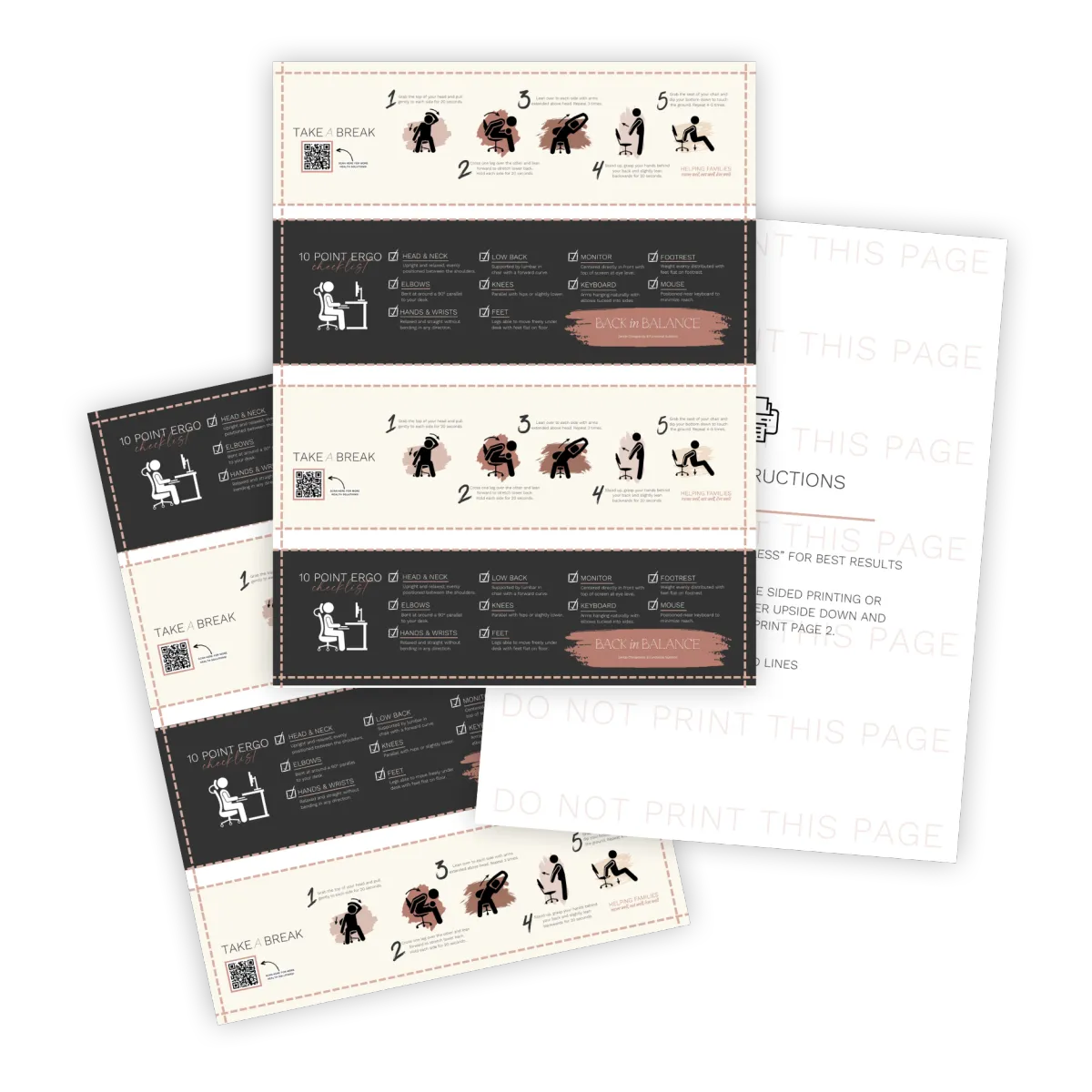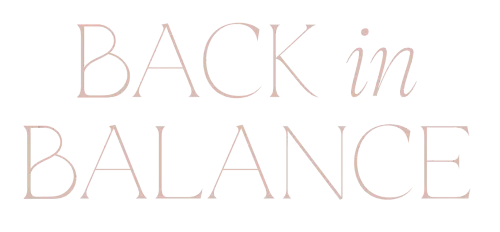

Apple Trackpad

Apple Keyboard


Are you wanting to get pregnant or expecting a little one? Get out free checklist today. This Ultimate Fertility and Pregnancy Checklist gives you everything you need to know for optimized health.

Unlock the secrets to managing stress with our Overcoming Stress Mini Course. Learn how to leverage your nervous system to reduce anxiety and improve well-being. Join today for quick, effective stress relief strategies. Perfect for busy individuals seeking a healthier, stress-free life.

Are you wanting to get pregnant or expecting a little one? Get out free checklist today. This Ultimate Fertility and Pregnancy Checklist gives you everything you need to know for optimized health.

Do you ever feel stiff and sore from sitting all day? If so, download our printable bookmark and walk through the 10 point ergonomic checklist to help you get back in balance from anywhere!





Debunking 5 Common Myths About the Third Trimester of Pregnancy
The third trimester of pregnancy comes with many surprises, joys, and yes—misconceptions. While every pregnancy is unique, certain myths can lead to unnecessary stress for moms-to-be. Let’s break down five common myths about the third trimester, uncovering what’s fact and what’s fiction.
Myth 1: Heartburn Means Your Baby Will Have a Lot of Hair
Many expectant mothers associate heartburn with their baby having a full head of hair. While it’s a fun myth, there’s no clinical evidence to support this. Heartburn is often caused by the baby pressing on the mother’s internal organs, especially as the uterus expands and shifts organs upward.
Interestingly, chiropractic adjustments targeting the esophagus and stomach area can sometimes provide relief. Aligning the mom’s spine can reduce nerve pressure and help with digestion, minimizing heartburn symptoms.
Fact Check: The amount of hair your baby is born with has no proven correlation to heartburn.
Myth 2: Pregnancy Brain Is Normal
“Pregnancy brain” is often joked about as a natural part of pregnancy, but it’s more common than it is normal. This mental fog can often result from poor nutrition and insufficient digestion of essential nutrients like protein and fats.
These nutrients play a critical role in repairing and maintaining the myelin sheath that protects your nerves. If digestion is sluggish or insufficient, this can exacerbate feelings of forgetfulness or mental fatigue. Ensuring proper nutrition and digestion, including having regular bowel movements, can alleviate symptoms.
Pro Tip: Focus on not just eating nutrient-dense foods but also optimizing digestion to break them down effectively.
Myth 3: Frequent Nighttime Urination Is Caused by the Baby Pressing on Your Bladder
While it’s true that late in pregnancy the baby can press on your bladder, frequent urination in the earlier part of the third trimester is often due to dehydration. When the body is dehydrated, water may pass through too quickly for cells to absorb it.
To better hydrate, consider adding a pinch of Himalayan or pink salt to your water. These minerals help cells absorb water more effectively, reducing nighttime trips to the bathroom and improving sleep quality.
Quick Fix: Mineral-rich water can improve hydration and reduce nighttime interruptions.
Myth 4: Labor Always Starts with Your Water Breaking
Thanks to movies, many of us picture labor beginning with a dramatic gush of water. In reality, this only happens in about 10-15% of cases. For most women, labor begins with contractions, and the water may break later or even need to be manually broken during delivery.
Additionally, the average time for labor in non-medically induced pregnancies is closer to 41 weeks and 2 days, not 40 weeks as commonly thought.
Did You Know? Your water breaking first is the exception, not the rule.
Myth 5: Baby’s Size Determines the Ease of Labor
One common worry is that a larger baby might make labor more difficult. While baby size is a factor, the baby’s position is far more critical. A head-down position ensures the smoothest delivery, and maintaining proper pelvic alignment can encourage this positioning.
Chiropractors certified in the Webster Technique work to balance the mother’s pelvis, reducing tension in the pelvic floor muscles and ligaments. This creates an optimal environment for the baby to remain head-down, minimizing complications such as breech or transverse positions.
Key Insight: Focus on alignment and baby positioning, not size, for a smoother labor experience.
Final thoughts
The third trimester of pregnancy is full of changes, but understanding the truth behind these common myths can make the journey less stressful and more empowering. Stay informed, seek support from trusted professionals, and remember—every pregnancy is unique.
Next Week: Join us as we tackle five myths about postpartum recovery!

Debunking 5 Common Myths About the Third Trimester of Pregnancy
The third trimester of pregnancy comes with many surprises, joys, and yes—misconceptions. While every pregnancy is unique, certain myths can lead to unnecessary stress for moms-to-be. Let’s break down five common myths about the third trimester, uncovering what’s fact and what’s fiction.
Myth 1: Heartburn Means Your Baby Will Have a Lot of Hair
Many expectant mothers associate heartburn with their baby having a full head of hair. While it’s a fun myth, there’s no clinical evidence to support this. Heartburn is often caused by the baby pressing on the mother’s internal organs, especially as the uterus expands and shifts organs upward.
Interestingly, chiropractic adjustments targeting the esophagus and stomach area can sometimes provide relief. Aligning the mom’s spine can reduce nerve pressure and help with digestion, minimizing heartburn symptoms.
Fact Check: The amount of hair your baby is born with has no proven correlation to heartburn.
Myth 2: Pregnancy Brain Is Normal
“Pregnancy brain” is often joked about as a natural part of pregnancy, but it’s more common than it is normal. This mental fog can often result from poor nutrition and insufficient digestion of essential nutrients like protein and fats.
These nutrients play a critical role in repairing and maintaining the myelin sheath that protects your nerves. If digestion is sluggish or insufficient, this can exacerbate feelings of forgetfulness or mental fatigue. Ensuring proper nutrition and digestion, including having regular bowel movements, can alleviate symptoms.
Pro Tip: Focus on not just eating nutrient-dense foods but also optimizing digestion to break them down effectively.
Myth 3: Frequent Nighttime Urination Is Caused by the Baby Pressing on Your Bladder
While it’s true that late in pregnancy the baby can press on your bladder, frequent urination in the earlier part of the third trimester is often due to dehydration. When the body is dehydrated, water may pass through too quickly for cells to absorb it.
To better hydrate, consider adding a pinch of Himalayan or pink salt to your water. These minerals help cells absorb water more effectively, reducing nighttime trips to the bathroom and improving sleep quality.
Quick Fix: Mineral-rich water can improve hydration and reduce nighttime interruptions.
Myth 4: Labor Always Starts with Your Water Breaking
Thanks to movies, many of us picture labor beginning with a dramatic gush of water. In reality, this only happens in about 10-15% of cases. For most women, labor begins with contractions, and the water may break later or even need to be manually broken during delivery.
Additionally, the average time for labor in non-medically induced pregnancies is closer to 41 weeks and 2 days, not 40 weeks as commonly thought.
Did You Know? Your water breaking first is the exception, not the rule.
Myth 5: Baby’s Size Determines the Ease of Labor
One common worry is that a larger baby might make labor more difficult. While baby size is a factor, the baby’s position is far more critical. A head-down position ensures the smoothest delivery, and maintaining proper pelvic alignment can encourage this positioning.
Chiropractors certified in the Webster Technique work to balance the mother’s pelvis, reducing tension in the pelvic floor muscles and ligaments. This creates an optimal environment for the baby to remain head-down, minimizing complications such as breech or transverse positions.
Key Insight: Focus on alignment and baby positioning, not size, for a smoother labor experience.
Final thoughts
The third trimester of pregnancy is full of changes, but understanding the truth behind these common myths can make the journey less stressful and more empowering. Stay informed, seek support from trusted professionals, and remember—every pregnancy is unique.
Next Week: Join us as we tackle five myths about postpartum recovery!
Sign up for our no spam newsletter.
Stay Connected
©2025 Back In Balance Health. All Rights Reserved. – WEBSITE By: Danielle Damrell Creative Collective, Inc.


